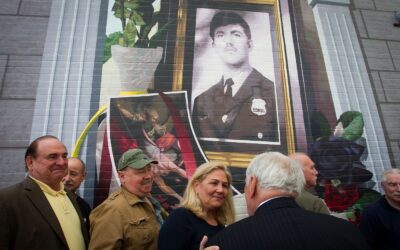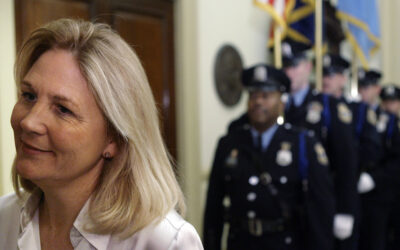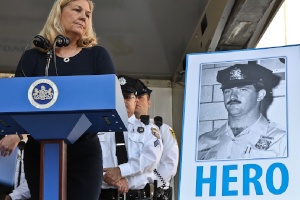Myth # 6
Myths About Mumia
The police intimidated and coerced witnesses, lost and withheld evidence in an attempt to frame Mr. Jamal and deny him a fair trial.
In their 1995 closing argument the defense states, “For almost 13 years the prosecution has promoted the false representation that the evidence in this case is overwhelming. In fact, it is more like a house of cards that has been propped up by prosecutorial and police fabrication, coercion, alternatively coercion and promises made to witnesses. And misrepresentation, destruction of evidence.” (9-11-95, T.R. 23)
BRIEF REBUTTAL
In a classic tactical ploy used by defense attorneys when their clients are guilty, we find Mr. Jamal’s attorneys attempting to put the police and the legal system itself on trial. To date however, the defense has never actually established and verified one instance of police coercion, lost evidence, or conspiracy in this case that stood up to scrutiny in the courtroom. Despite this, Mr. Weinglass continues to make these unsubstantiated allegations outside the courtroom for media consumption.
The defense regularly makes pointed allegations of criminal conduct against several parties in this case. If they have evidence to back their serious assertions, wouldn’t they immediately present it to the proper authorities and let them proceed with a criminal prosecution of the guilty parties. Until such time, these allegations remain nothing more than a baseless ploy designed to deflect attention away from the guilt of their client.
EXAMPLES AND FACTS
CLAIM – The defense claims a bullet fragment was lost or withheld by the police that would have allowed the bullet to be traced to a gun other than Mr. Jamal’s.
FACTS – The Medical Examiner was never asked by the defense to account for any “missing bullet fragments” at the 1995 PCRA hearing. The defense had their chance to prove for the record that a bullet fragment was actually missing and then verify that it had been lost by the police. However, no attempt was made to do so. Despite their many out-of-court assertions, the defense failed to introduce any such evidence at all in the 1995 hearing. To this day there is still no proof that any fragment is, in fact, “missing”.
CLAIM – The Police allowed Cynthia White, a prostitute and witness for the prosecution, to “work the streets with impunity”, and failed to disclose alleged police protection afforded to Ms. White in return for favorable testimony. This claim is based on an assertion made by another prostitute, Veronica Jones (who was mentioned earlier in this piece) and by Mr. Jamal’s investigator, Robert Greer.
FACTS – Ms. Jones testified at the 1996 PCRA hearing. Beyond conversations Ms. Jones purported to have had with Cynthia White, Ms. Jones and Jamal’s attorneys produced no tangible proof to back her allegations. In her 1996 testimony, Jones stated that White’s alleged “deal” was made by police officers whose names Jones couldn’t remember. Ms. Jones was also unable to remember when the alleged “deal” was made, or what the benefits to Ms. White were, beyond being permitted to ply her trade without being arrested.
At the 1996 hearing, Ms. Jones repeatedly appeared quite confused as to whom she had spoken to about anything in 1982. She stated that a factor contributing to her confused state in 1996 was her heavy drug use throughout the 1980’s.
In addition to her alleged conversation with Cynthia White, Ms. Jones, who in 1982 had been arrested on an armed robbery charge, now claims that she too was visited by police officers while awaiting trial. She alleges that these officers offered her a deal similar to the one allegedly provided for Ms. White, and that they threatened to go hard on her in regards to her pending armed robbery charge, if she didn’t cooperate with them.
Again, Ms. Jones recollection regarding the facts of her own alleged meeting with police in 1982 is very unclear. While testifying in 1996, she was unable to remember what the specifics of this alleged deal were and she failed to remember how the deal was to benefit her, beyond being given a break on her pending felony case. Further, Jones couldn’t remember the names of the officers that allegedly visited her or when the visit occurred.
The defense was once again unable to produce any corroborative evidence that this alleged meeting ever occurred or that any “deal” was made for Ms. Jones in 1982. Interestingly, in her 1996 testimony, Ms. Jones made it very clear that she never accepted any “deal” in 1982 to give false testimony against Mr. Jamal.
Additionally in 1982, Ms. Jones never mentioned the alleged police pressure, which included the offer of a deal directly connected to her pending armed robbery case, to the Public Defender who was representing her in that case.
If any deal regarding Ms. Jones pending felony case had been struck, it would have come not from the police, but rather the District Attorney. The police have no authority to address how cases are dealt with in the courtroom and therefore they couldn’t have held up their end of the supposed deal. Failure to do so would certainly have sent Ms. Jones running to the press. The District Attorney’s records were reviewed by the defense in 1996 and there is no evidence of a deal being cut for Ms. Jones or Cynthia White in 1982.
LEONARD WINEGLASS ACCUSATION DISCREDITED.
There is also evidence that completely discredits Mr. Wineglass accusation that “police offered Veronica Jones the same deal that Cynthia White got”. Mr. Weinglass claims the deal allegedly accepted by Ms.White was to allow her to work her corner unmolested by police if she gave testimony damaging to Mr. Jamal. Mr. Weinglass claims Ms. White accepted this offer and lied while testifying against Mr. Jamal in 1982.
What Mr. Weinglass doesn’t acknowledge is what Cynthia White’s arrest record shows. When reviewed, it shows that Ms. White was arrested for prostitution twice within a week of giving the allegedly false testimony against Mr. Jamal. This fact dispels Mr. Wineglass contention that Ms. White had a deal cut for her unless the deal was to last only a week. Mr. Weinglass had easy access to White’s arrest record.
Upon completion of her testimony against Mr. Jamal, Cynthia White knew she would have to go back out into a neighborhood where many people considered Mr. Jamal a folk hero. At great risk, Cynthia White came forward and testified to the truth. Unless she felt that being given a week “to work the streets with impunity” offset the threat that Jamal’s supporters posed for her, we again find Mr. Weinglass ignoring the facts to support another self serving allegation.
THE ACCUSATION OF POLICE PROTECTION FOR CYNTHIA WHITE.
The accusation of police protection for Cynthia White came from Robert Greer, who was Mr. Jamal’s investigator. Greer claims that on several occasions in 1982, he attempted to speak to Ms. White, who was working as a prostitute. Greer claims that on each of the three times that he saw Ms.White, there were two individuals parked next to her in a “little red car”. The highly skilled Mr. Greer determined that they must have been undercover police officers protecting Ms. White.
In Robert Greer’s 1995 testimony he states,
“They appeared to be plain closed police officers, Yes sir.”
Assistant D.A. Joey Grant asks, “How does a police officer appear?”
Mr. Greer responds, “How does a police officer appear? I assumed that they were police officers simply because they never left the scene. If she was there, they were there.” (8-1-95, T.R. 188)
The basis of Mr. Greer’s observation was the fact that every time Ms. White was there, the “little red car” was there.
Yet Mr. Greer states that he only saw Ms. White on the street corner three times.
For some unknown reason, the presence of this “little red car” scared off the highly experienced Mr. Greer. He testified that despite being hired by the defense to contact Cynthia White and having seen Ms. White on at least three occasions, he never actually attempted to speak with her. Mr. Greer further testified that the two men in the vehicle never identified themselves as police officers, nor did they ever speak to him at any time. He also states that he only saw the back of their heads as they sat in the car, and that he never attempted to get a better look at the individuals inside the car to verify their identity. These are all rather highly questionable actions by a seasoned investigator who was accepting payment to locate a witness in a capital murder case.
POLICE PROTECTION FOR CYNTHIA WHITE?
Mr. Weinglass claims that the DA never notified the court of the alleged police protection afforded to Cynthia White, in violation of the rules of the court. However, to date Mr. Weinglass has produced no substantive evidence in the courtroom to corroborate his allegation that Cynthia White received police protection.
Furthermore, there wouldn’t have been any rational reason for the District Attorney’s Office not to have notified the court, had protection been afforded Ms. White. The DA had previously notified the court that there were other witnesses in this case who were openly given police protection prior to and during the 1982 trial. The Jamal trial was a very high profile, emotionally charged case. By the time it went to trial, Mr. Jamal had taken on a rabid cult following in Philadelphia’s inner city. It wasn’t unreasonable for the police and the DA to be concerned that witnesses testifying against him might be assaulted or intimidated by Mr. Jamal’s supporters. There is in fact evidence that this type of intimidation against other witnesses actually occurred in 1981.
Latest News
Abu-Jamal Moved to Prison Northwest of Philly Convicted killer moved to medium-security prison
Convicted killer moved to medium-security prison Former death row inmate Mumia Abu-Jamal has been transferred from a maximum-security prison in...
Decision on Mumia Abu-Jamal Sentence
Philadelphia—The District Attorney’s Office has decided after long and careful consideration, as well as consultation with the family of Officer...
The Pulse: After husband is murdered, 30 long years of phone calls
In California last Tuesday, Maureen Faulkner's telephone began ringing at 6:30 a.m. When she looked down and saw the instant onslaught of calls from...
NEVER FORGET DANIEL FAULKNER
Without the support of Justice for Police Officer Daniel Faulkner, the Faulkner family – and specifically Maureen – could not afford to keep up the vigilant fight.


